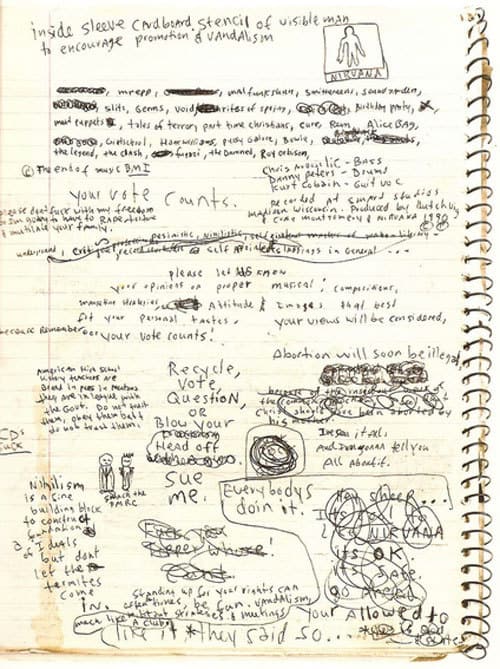Have you ever become aware of your thoughts? I mean truly aware. If so, you’ll probably have noticed that they’re disordered, disorganized and racing rapidly around your mind. Imagine if you could harness this and control it for your benefit!
This article aims to give you advice on organizing thoughts and ideas, providing you seven tools to help you decrease the chances of losing your ideas and make the most of them.
It’s helpful to think of each point as successive steps along the way. Here’re 7 simple steps you should start trying on how to organize your thoughts:
1. Keep a notebook in your car
Ideas seem to be able to come at any time. You need to be ready for this. As such it can be a great idea to keep notebooks in places where inspiration may appear.
It’s as the film maker Noah Baumbach once said
“I find a lot of writing happens when you’re not actually at the computer. So I carry a notebook”
Your car is a prime location to keep one.
Suddenly grabbing a notebook when driving can be extremely dangerous however. So if you have a method to record your voice while driving this is a great and safe substitute.
Alternatively, just keep driving until you find a safe place to pull over and write your idea down.
2. Keep a pen and paper on your bedside table
You probably know that your dreams aren’t just randomly occurring, each dream we have can tell us something about our subconsciousness, the meanings behind our thoughts and feelings.
Therefore it can be a good idea to be aware of your dreams, and with it, write down anything significant about them that springs to mind.
Our dreams are easily forgot, therefore keeping a notebook can be a great way to harness your mind when it’s at this extremely creative period.
Even when you’re not dreaming, lying down trying to sleep can often let your mind wander freely bringing your ideas to focus.[1] This can be quite annoying if you’re actually trying to sleep.
Keeping a notebook beside your bed can both help you note down your ideas ensuring you won’t forget them. As you’ve written you idea down, you don’t need to waste your energy trying to ensure you remember them. This might help you get to sleep faster.
3. Don’t organize the ideas as you jot them down at first
When you’re writing down your ideas, it can be tempting to ensure they’re written in an organized, ordered fashion. Fight this urge.
When you’re noting your ideas, you might find more and more ideas come at you. Taking time to ensure they’re immediately well organized can slow you down.
Look at the following picture:
It’s a mess of hastily written thoughts and crossed out ideas. The notebook above belonged to Mark Twain, one of the most important American writers of all time.
Take a look at the following too:
This one seems to have no control or order at all. It belonged to Kurt Cobain.
Both of the above messy notebooks belonged to some truly visionary and brilliant creatives. Looking at their notebooks, it is clear that their focus was on the ideas themselves and not how they appeared on the page.
I’m not saying that they should always be disorganized. You might find this will be unhelpful in the long run.
By all means, come back to your notes and organize them. But this shouldn’t be your priority at first.
4. Compile your ideas in one place (e.g. use apps like Evernote)
All of the points above are about the vital moments to catch and keep an idea before it goes. However, that isn’t enough. Your ideas need to be easily accessible.
As such, it is a great idea to keep your notes and ideas in a single place.
It’s great having all of your ideas down. But having them written in different places or formats can become a hindrance.
Copy your notes and have them in a single location. This can be a separate notebook but there are a number of great Apps which allow you to keep and store your notes right on your computer or smartphone. I recommend Evernote.
You might find ideas written in one place relate to another one written. Plus revisiting your notes can be a great way to bring them back to your mind, perhaps inspiring more and better ideas.
5. Organize your ideas
Now that your ideas are compiled, it’s time to organize them in a way that is helpful and easy to understand.
One quick and easy way to organize your ideas is to categorize them.
You might have noticed some of your ideas are linked or related thematically. Consider what links them them note them under this idea. If you have many ideas, you could even make subcategories.
For example, if you’re a fiction writer, you could group some of your ideas under “Stories” and the form you think the story should be told: a drama script, a novel, or short story etc. Then with separate subgroups for genre such as historical fiction or sci-fi.
With this, you can develop on ideas in a way that is quick and efficient.
6. Kill your darlings
Once you’ve got all your ideas written down and organized. It’s time for the real work to begin — to figure out what ideas to keep and what ideas to get rid of.
“Kill your darlings” is an important advice for writers. It means that you have to get rid of your most “precious” ideas and words.
Not all ideas are equal. In your notes, there could be a truly brilliant original idea but the chances of them all being like this are unfortunately slim. There is no point wasting your time on an idea that will never work.
Sometimes, it can be difficult to tell which of your ideas are great and which are not. Trusting your gut can be a good way, talking to people about your ideas and seeing how they react can also be a good idea.
If you aren’t sure how to decide if an idea is good enough, take a look at this guide:
5 Ways To Find Out If Your Idea Is Worth Pursuing
Remember to get rid of your emotions surrounding your ideas and approach them in an honest and objective way.
Once you’ve trimmed your ideas down to the very best, you can work on making them a reality.
7. Make your ideas actionable
You could have an amazing idea for something but if you don’t work on your ideas, nothing happens.
You need to start making your ideas a reality. Make them actionable.
A great way to do this is to approach each idea in turn and ask yourself the following questions:
- How can I make this relevant to my everyday life?
- Which ideas would be most beneficial to act on today and why?
- Is there a common theme emerging here? If so, how could I combine these ideas together to make them more powerful?
These questions enable you to work out which idea is most actionable and what idea you should first start working on.
With the above seven steps in mind, you’ll be able to master your ideas making potential.
With them, your thoughts and feelings can be utilized to boost your productivity.
Featured photo credit: Pexels via pexels.com
Reference
| [1] | ^ | Scientific American: Can We Control Our Thoughts? Why Do Thoughts Pop into My Head as I’m Trying to Fall Asleep? |














































